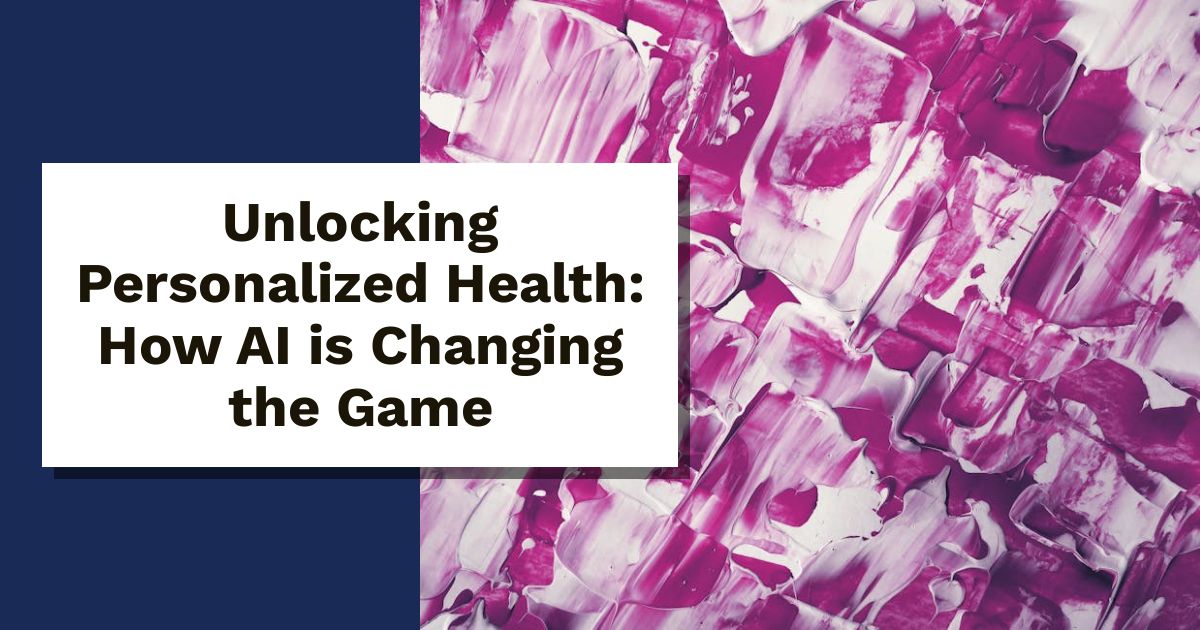In a world where each of us is unique, why should our health care be any different? Personalized health is taking center stage, thanks to advances in AI. This technology makes it easier to tailor health strategies to fit our individual needs.
Imagine having insights about your health that are as specific as your DNA. This isn’t just a dream; it’s becoming a reality. With AI, we can analyze data and predict outcomes that help us live healthier lives.
As we explore this topic, you’ll discover how AI is reshaping personalized health. You’ll learn about innovative approaches that not only improve well-being but also empower you to take charge of your health journey. Let’s dive into how AI is creating a smarter, more tailored approach to staying healthy!
What is Personalized Health?
Personalized health is a revolutionary approach that adapts to each individual’s specific health needs. At its core, personalized health means recognizing that no two people are the same. It focuses on tailoring healthcare experiences to fit unique characteristics, which include genetics, lifestyle, environment, and personal preferences. This approach allows for more effective prevention, diagnosis, and treatment of diseases.
Definition and Key Concepts
Personalized health combines various fields, including genetics, data analysis, and medical history. It utilizes advancements in technology, especially artificial intelligence, to gather and interpret vast amounts of health-related data. This data-driven strategy enables healthcare providers to create customized health plans for individuals, enhancing the overall effectiveness of medical interventions. For example, treatments can be designed based on a patient’s genetic makeup, maximizing their chances of success while minimizing side effects. To explore more about personalized medicine, check out Personalized Medicine.
Importance of Personalization
Why does personalization matter in healthcare? There are several compelling reasons:
- Enhanced Effectiveness: Personalized care leads to better outcomes. When treatments are tailored to the patient, they are more likely to work.
- Improved Patient Engagement: When patients see their healthcare plans are designed specifically for them, they are more likely to participate actively in their health.
- Cost Efficiency: By preventing ineffective treatments and hospital readmissions, personalized health can reduce healthcare costs over time, making it accessible for more people. A detailed look into this can be found in Delivering on the Promise of Personalization in Health Care.
- Proactive Prevention: Personalized health allows for early detection of potential health issues, leading to timely interventions that can prevent serious conditions.
With the rise of AI and data analytics, the capacity to implement personalized health strategies has never been greater. As the landscape continues to evolve, understanding and embracing personalized health could be the key to thriving in your wellness journey. For further insights into how this can improve patient experiences, consider reading The Patient Experience of the Future is Personalized.
Role of AI in Personalized Health
Artificial Intelligence (AI) plays a pivotal role in making personalized health a reality. With its data-crunching abilities, AI transforms mountains of health data into actionable insights. Let’s break down this transformative power through key areas: data analysis, predictive analytics, and tailored treatment plans.
Data Analysis
AI automates and enhances the process of analyzing personal health data. Imagine sifting through thousands of medical records, lab results, and genetic information. It sounds overwhelming, right? But with AI, this task becomes efficient. Algorithms scour the data, identifying patterns and trends that a human might overlook.
For instance, AI can detect subtle changes in your routine, such as sleep patterns or activity levels, to provide relevant health insights. These insights inform your healthcare providers, helping them understand your unique health profile. The result? More accurate diagnoses and proactive health recommendations. To see how AI revolutionizes data analysis, check out this article on Precision Medicine and AI.
Predictive Analytics
What if you could foresee potential health risks before they manifest? AI makes this possible with predictive analytics. By analyzing historical health data alongside current trends, AI can identify risk factors specific to individuals.
Take heart disease, for example. An AI system considers genetics, lifestyle choices like diet and exercise, and even environmental factors. It calculates the odds of developing conditions over time, empowering you to make informed decisions. This proactive approach can significantly enhance your well-being and extend your life. For a deeper dive into the benefits of predictive analytics in healthcare, visit NCBI’s insights on predictive algorithms.
Tailored Treatment Plans
Gone are the days of one-size-fits-all treatment. AI is changing the way healthcare professionals design treatment plans. By analyzing vast amounts of data, AI can generate strategies tailored to your specific needs.
Imagine your doctor prescribing a treatment plan based on your genetics, lifestyle, and medical history. It’s like having a personalized recipe for health! AI algorithms utilize insights from previous cases to create plans that optimize effectiveness while minimizing side effects. This leads to better health outcomes and increased patient satisfaction. For more on how tailored treatment plans enhance individual care, read about how AI leads to personalized medicine.
With these advancements in AI, personalized health is more than just a concept; it’s becoming a reality that empowers you to take charge of your health journey.
Current AI Technologies in Use
AI is changing the way we approach health. From wearables that keep tabs on our body to apps that personalize our experience, the landscape is thriving with innovation. Let’s look at some specific technologies that are making waves in personalized health.
Wearable Devices
Wearable technology is more than just a trendy accessory; it’s a powerful health tool. Devices like fitness trackers and smartwatches monitor vital health metrics such as heart rate, sleep patterns, and physical activity. But what’s truly exciting is how AI plays a role in making sense of all this data.
These wearables continuously gather information, providing real-time feedback to users. For example, if your heart rate spikes during a workout, your device can alert you to adjust your intensity. It’s like having a personal trainer on your wrist! These devices are also helping manage chronic conditions by sending alerts when something seems off, making healthcare more proactive. To learn more, check out how AI-powered wearables are reshaping healthcare here.
Mobile Health Apps
Mobile health apps are taking personalization to the next level. With AI, these apps analyze users’ behaviors, preferences, and health data to create tailored health plans. No more cookie-cutter solutions; everything is customized just for you!
For instance, apps like Noom focus on weight loss by adjusting plans based on daily habits and progress. They use AI to provide insightful feedback, helping users stay motivated. Think of it as having a health coach in your pocket! To explore popular AI-based mobile health apps, visit this link here.
Genomics and AI
Genomics is where AI truly shines. By analyzing genetic data, AI can uncover information about an individual’s health risks and treatment options. Imagine a world where your genetic makeup informs your healthcare plan – that’s the power of AI in genomics.
AI algorithms sift through vast amounts of genetic data to find patterns and correlations, helping doctors make better decisions tailored to each patient. For example, if certain genes indicate a higher risk for a specific condition, your healthcare team can devise preventive strategies. This blend of genomics and AI is paving the way for the future of personalized medicine. Learn more about this exciting field here.
Challenges to Implementation
While the promise of personalized health through AI is thrilling, several challenges stand in the way. These hurdles can limit the effectiveness of these advancements, from data privacy concerns to access disparities. Let’s explore some of the main issues that need to be addressed.
Data Privacy Concerns
One of the most pressing issues in healthcare today is data privacy. When it comes to AI, the collection and storage of health information raise major questions. Patients want to know their data is safe. Unfortunately, breaches and unauthorized access are ever-looming threats, making people nervous about sharing their information.
- A survey found that over 92% of patients believe their health data should be confidential and not available for sale. This shows the intense concern around data privacy (source: AMA).
- Health data can be vulnerable to various attacks, including phishing and ransomware. Understanding these threats is crucial for healthcare providers (source: Fortinet).
- To build trust, healthcare systems must prioritize transparent data practices. Patients need to feel secure about who accesses their information and how it is used (source: Cisive).
Accuracy of AI Predictions
AI models are only as good as the data they analyze. For personalized health applications to work effectively, accuracy is crucial. If an AI model makes mistakes, it can lead to serious health consequences.
- Studies show that achieving high prediction accuracy is vital for AI’s role in healthcare. An accuracy rate below 80% could mislead treatment plans and patient assessments (source: BMC Medical Education).
- If AI predictions are flawed, it could result in misdiagnoses or incorrect treatment recommendations. For example, improvements in diagnostic accuracy can occur when AI models are reliably integrated (source: JAMA).
- Thus, developers and healthcare professionals must continuously refine AI algorithms. They should ensure consistent monitoring to mitigate risks and maintain quality care (source: Duke University).
Access and Equity
While technology can enhance healthcare, not everyone has equal access to its benefits. Who gets to use these innovations often depends on socioeconomic factors, leaving some behind.
- Major barriers like availability, affordability, and access to technology lead to disparities in care. Addressing these issues is essential for achieving health equity (source: PMC).
- If we neglect digital equity in healthcare, those without access to technology will struggle to benefit from personalized health strategies. This can deepen existing disparities (source: IEEE).
- Consequently, healthcare providers must take proactive steps to ensure that everyone has the opportunity to benefit from personalized health technologies. This involves creating solutions tailored for underserved populations (source: Health Data Management).
Addressing these challenges is paramount for advancing personalized health through AI. By focusing on privacy, accuracy, and equitable access, we can pave the way for a healthier future for all individuals.
Future of Personalized Health with AI
As we look ahead, the future of personalized health powered by AI seems bright and promising. Exciting advancements are on the horizon, promising transformative changes in how we approach health care.
Emerging Technologies
New AI advancements continue to reshape personalized health. From machine learning algorithms to sensor technologies, these innovations are nothing short of fascinating. Here are some noteworthy emerging technologies:
- AI-Driven Diagnostics: These tools use algorithms to analyze medical images and data for faster and more accurate diagnoses.
- Smart Wearable Devices: Imagine wearables that not only track daily activities but also suggest health interventions tailored to your needs.
- Telemedicine: AI chatbots and virtual assistants can provide 24/7 health advice, making healthcare more accessible.
These technologies lead to a more individualized health experience. For a deeper understanding of this shift in patient care, check out What’s the Future of AI in Health Tech?.
Integration with Traditional Health Care
AI is not here to replace your doctor; it’s here to work alongside them. The integration of AI with traditional health care methods can create a more well-rounded approach to treatment. This partnership offers several benefits:
- Enhanced Decision Making: AI analyzes vast amounts of health data, helping doctors make informed decisions and develop personalized treatment plans.
- Holistic Patient Care: By combining traditional methods with AI insights, healthcare providers can address a patient’s full spectrum of needs.
- Efficiency in Operations: AI can streamline administrative tasks, allowing healthcare professionals to focus more on patient care.
To learn more about integrating these approaches, take a look at How is AI being Used in the Healthcare Industry.
The Biohacker’s Perspective
Biohackers are always searching for that extra edge in health and performance. AI can be a game-changer in this quest for optimization. Here’s how biohackers can reap the benefits:
- Personalized Health Protocols: AI can analyze individual health data to recommend tailored protocols for diet, exercise, and sleep.
- Real-Time Feedback: Biohackers can leverage AI-driven apps that provide immediate insights into body metrics, enabling them to adjust their strategies on the fly.
- Predictive Analytics: With AI’s predictive capabilities, biohackers can foresee potential health issues and take preventive actions.
This integration could revolutionize how biohackers approach health management. For further exploration, see Harnessing AI for Personal Health and Community Well-Being.
In summary, the future of personalized health through AI shows immense potential. With emerging technologies, improved integration with traditional care, and biohacker insights, we’re on the brink of a health revolution.
Conclusion
The strides in personalized health through AI are transforming how we view our health journeys. Tailoring treatments and insights to individual needs empowers you to take control of your wellness like never before.
Embrace these advancements and consider how they can enhance your daily life. With the right tools and knowledge, you can optimize your health and well-being.
What will you do next on your personalized health journey? The choice is yours, and the future is bright!
Brooke is a rock-climbing 🧗♀️, tennis-playing 🎾, biohacking 🧬 bookworm 📚 on a mission to unlock the secrets of health, longevity, and living life to the fullest 🌟. When she’s not scaling cliffs, hitting the courts, or testing out the latest hacks, you’ll find her nose in a book or adventuring with her four-legged best friend 🐕 by her side. With a knack for turning science into simple, actionable tips, Brooke’s writing is your guide to hacking your biology and living your best, most vibrant life!


